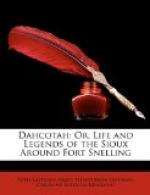The maidens clasp their small hands—a vain appeal to the merciless wretches, who see neither beauty nor grace, when rage and revenge are in their hearts. It is blood they thirst for, and the young and innocent fall like grass before the mower.
Flying Shadow sees her lover! he is advancing towards her! What does his countenance say? There is sadness in his face, and she hopes—aye, more than hopes—she knows he will save her. With all a woman’s trust she throws herself in his arms. “Save me! save me!” she cries; “do not let them slay me before your eyes; make me your prisoner! [Footnote: When the Sioux are tired of killing, they sometimes take their victims prisoners, and, generally speaking, treat them with great kindness.] you said that you loved me, spare my life!”
Who shall tell his agony? For a moment he thought he would make her his prisoner. Another moment’s reflection convinced him that that would be of no avail. He knew that she must die, but he could not take her life.
Her eyes were trustingly turned upon him; her soft hand grasped his arm. But the Sioux warriors were pressing upon them, he gave her one more look, he touched her with his spear, [Footnote: When a Dahcotah touches an enemy with his spear, he is privileged to wear a feather of honor, as if he had taken a scalp.] and he was gone.
And Flying Shadow was dead. She felt not the blow that sent her reeling to the earth. Her lover had forsaken her in the hour of danger, and what could she feel after that?
The scalp was torn from her head by one of those who had most admired her beauty; and her body was trampled upon by the very warriors who had so envied her lover.
The shrieks of the dying women reached the ears of their husbands and brothers. Quickly did they retrace their steps, and when they reached the spot, they bravely stood their ground; but the Dahcotahs were too powerful for them,—terrible was the struggle!
The Dahcotahs continued the slaughter, and the Chippeways were obliged at last to give way. One of the Chippeways seized his frightened child and placed him upon his back. His wife lay dead at his feet; with his child clinging to him, he fought his way through.
Two of the Dahcotahs followed him, for he was flying fast; and they feared he would soon be out of their power. They thought, as they nearly came up to him, that he would loose his hold on his child; but the father’s heart was strong within him. He flies, and the Sioux are close upon his heels! He fires and kills one of them. The other Sioux follows: he has nothing to encumber him—he must be victor in such an unequal contest. But the love that was stronger than death nerved the father’s arm. He kept firing, and the Sioux retreated. The Chippeway and his young son reached their home in safety, there to mourn the loss of others whom they loved.
The sun set upon a bloody field; the young and old lay piled together; the hearts that had welcomed the breaking of the day were all unconscious of its close.




